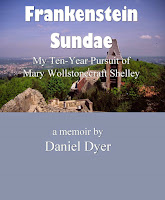1.
AOTW: I've been going to this same health club since 1999 (pretty much). And, as a result, I have some ... habits: a locker I like to use, shower head I like, etc. I am not OCD about it all, but I do prefer them, both out of habit and a dash of madness. Okay, there's been a New Guy around for a couple of weeks--comes in to work out about the same time I do. And he likes the same shower head. No problem for me (though I do grouse, silently (till now), about it). But this week ... one day ... I was at my locker, disrobing for the shower; he came in; saw me; jogged to his locker; dropped his shorts, etc. in a wet pile; left them on the carpet; jogged into the shower room to that shower head. My reaction was a mixture of wonder, dread, respect, disdain, revulsion, jealousy, etc. But I settled for conferring upon him the AOTW Award.
2. I finished a couple of books this week ...

- Ron Hansen's 2016 novel,
The Kid (yes, about Billy). I enjoyed this novel because (among other things) it sticks to the story--the historical story--and does not continue promulgating the myth of the Kid's killing 21 by the time he was 21, etc. Hansen does, of course, invent dialogue (much is clever and, probably, a bit anachronistic), does attribute to the Kid an almost eerie skill with a pistol (not likely), does change the name of his buddy Tom O'Folliard to Tom O. Folliard (I can't find anyone else doing this), and Hansen "fleshes out" the sexual relationships between the Kid and Sallie Chisum (daughter of the Chisum played by John Wayne in that eponymous 1970 film--
link to trailer (the Kid is in it, by the way--minor role)) and Celsa Saval. Lots of funky stuff goin' on!

Hansen employs a technique I at first didn't care for, then did: He tells us, as a character is about to pretty much disappear from the story, what eventually happened to him/her. (Some lived well into the 20th century.) These stories had an accumulated weight that ended up affecting me deeply. The evanescence of life, and all.
And, of course, throughout there is a powerful dramatic irony: We
know what is going to happen to the Kid, and so on virtually every page there's something that stuns us with its emotional significance. A very good novel for Billy Freaks (like me)--and the more you know about his story, the more you'll enjoy the story--though knowing zip will be no impediment!
- Richard Ford's first novel,
A Piece of My Heart (1976). I've read a couple of Ford's later novels but decided I would now read them all, in the order that he wrote them, and this very first one was a stunner. Ford, who is about ten months younger than I am, was only about 32 when he published
Piece of My Heart, and it's just hard for me to imagine--as it was when I read the early novels of Richard Russo--how someone could be so
good so
soon. (Well, Billy the Kid was only 21 when he died!)

The story is told from two perspectives (both with 3rd-person narration), Robard Hewes and Sam Newell, both of whom end up on the same uncharted island in the American South, a place where an oddball character, a cantankerous crusty old dude named Lamb, lives with his wife; Lamb charges hunters a fee to come to his island for turkey-shooting, etc., and hires guys during hunting season to make sure no other hunters have sneaked into the area to shoot for free.
Enter Hewes and Newell, both of whom end up there as guards, both with backstories that we gradually learn more and more about. Both men troubled. Hewes has the more compelling story: He is sexually involved (
very sexually involved) with his cousin, Beuna, who's married to someone else. Her husband, W. W., a sometime minor league baseball player, is not happy about it.
There are also a couple of feral young men, mentioned on the opening page, whose presence Ford reminds us of a few times, and we realize they will have some mortal role to play in the tale. And so they do.
A powerful book--a good omen for what's to come. Full of sentences like this one, very early (a sentence about Hewes): "... nothing in his life
ever ended. Things only changed and grew up into something else" (12).
I've already ordered Ford's second novel,
The Ultimate Good Luck (1981), and will get to it as soon as I read Jonathan Lethem's new one (
A Gambler's Anatomy), which just arrived this week!
3. In this political season it seems that far too many of us are more interested in
confirmation than
information.
4. We're enjoying our streaming (via Acorn) of season 7 of
George Gently, a Brit copper show that's one of the best out there, I think. (And thanks to friend Lisa Johnson for the tip about Acorn.) The shows are so good we're not letting ourselves binge--we even break up each episode into several portions--like saving some good pastry--not wolfing it down all at once.
5. Final Words--Some words I liked this week (for various reason) from my various online word-of-the-day sites:
a. never-sweat, n. (from OED)
An idle or lazy person; (also) a person whose occupation is
considered to require little effort.
Etymology: < never
adv. + sweat v.
slang and regional
(now chiefly N. Amer. and Austral.).
1851 H. Mayhew London
Labour I. 419/1 Flare up, my never-sweats.
1863 Humboldt Reg. (Unionville, Nevada) 27 June 1/3 They
were objectionable; and why? Because they were owned by a parcel of Honey Lake
‘never-sweats’.
1890 C. Erskine
Twenty Years before Mast 18, I was one of the forties, that is, the
‘never-sweats’,—a mizzen-top man.
c1928 R. W. Ritchie
Hell-roarin' Forty-niners 196 The lordly miners dubbed the farmers of Honey
Lake Valley Never Sweats.
1939 Menace of Speed Coursing (Plympton Park Citizen's
Committee, Adelaide) 4 Dog racing produces nothing. It simply keeps a number of
bookmakers and ‘never-sweats’ in their jobs.
1974 D. Wilson
Staffs. Dial. Words 48 Neversweat, a person who is never in a hurry, or who is
lazy.
1994 R. Hendrickson
Happy Trails 166 Never-sweat, an old derogatory name for a Mexican worker.
b. sassy (SAS-ee) (from wordsmith.org)
MEANING:
adj:
Impudent; bold; outspoken; lively; feisty; stylish.
ETYMOLOGY:
Alteration
of saucy, from sauce, from Latin salsa,
from sallere (to salt), from sal (salt). Ultimately from the
Indo-European root sal- (salt), which
is also the source of silt, sausage, salad, salami, salary, and salmagundi.
Earliest documented use: 1833.
USAGE:
“Ada had
sounded like her strong and sassy self on the phone.”
Laura
Trentham; Slow and Steady Rush; St. Martin’s; 2015.
c. plusquamperfection,
n. (from OED)
Utter perfection.
Origin:A borrowing from Latin. Etymon: Latin plūs quam.
Etymology: <
German Plusquamperfektion (1603 as plusquamperfection in the passage
translated in quot. 1670) < classical
Latin plūs quam more than (see plusquam- comb. form) + German Perfektion
perfection n. Compare post-classical Latin plusquam perfectio (1687 in the
passage translated in quot. 1688; 8th cent. in a British source in grammatical
sense).
Alchemy. Now hist.
and rare.
1657 tr. B.
Valentinus Last Will & Test. iii. 117 This liquor is the true prima materia,
and first seed of Metals and Minerals, which by Vulcans Art is brought to a
plusquam perfection [Ger. plusquamperfection], into a transcendent fix'd
Medicine, out of which is generated the true Philosophick stone.
1670 D. Cable tr. B.
Valentinus Of Nat. & Supernat. Things iii. 57 If it..be brought to a
perfect ripeness, unto the Plusquam perfection [Ger. plusquamperfection],
nothing may compare therewith.
1688 C. Packe tr. F.
M. van Helmont 153 Chymical Aphorisms 22 Aph. 135 Wherefore this ought to be
done to the matter of our Menstruum, for its compleat Depuration, equally as to
Gold, for its plusquam perfection [L. ad ejus plusquam pefectionem].
1713 Rosie Crucian Secrets(MS Harl. 6485) f. 268, It is a
heavenly balsam because its first principles and original cometh from heaven,
made formal in earth or under ground, and is afterwards, being exactly
prepared, brought into a plusquam perfection.
1925 R. W. Councell
Apologia Alchymiæ v. 74 No gold of plusquam perfection is formed; but bare
gold.































